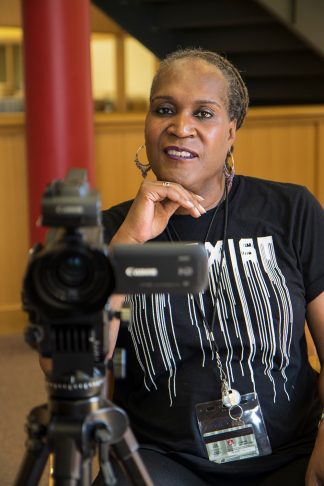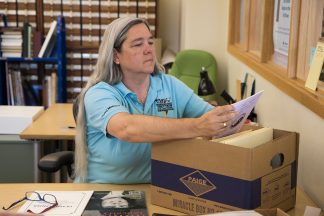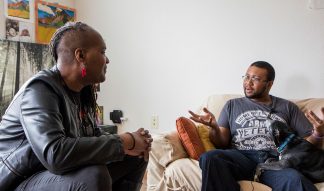By Karen Carmody-McIntosh
‘The gender revolution is here.’
Andrea Jenkins sits beside her video camera and audio recording equipment. She has just finished interviewing Ash Scott about his experiences growing up and then joining the military. Ash’s narrative will be transcribed, sent back to him to review for accuracy, and then it will take its place online as a video accessible through the University Libraries website.
Jenkins is Project Lead for the Transgender Oral History Project, hired by the Tretter Collection in GLBT Studies specifically to recruit narrators like Ash, document their stories, and create the online archive of oral history videos. Jenkins benefits from 25 years of experience as an activist in the transgender community.
And yet, even she finds her ideas about gender augmented by new insights as she records the stories of 200 individuals — the narrators — who share their perspectives with her for the project.
“I’ve been amazed and maybe somewhat surprised by the variety
of gender identities out there that people name and claim as their own.”
Lisa Vecoli, Curator of the Tretter Collection, echoes that sentiment. “We are documenting a transitional moment. As we look back at those who transitioned decades ago — it was very much perceived as a binary; you started in one place and you moved to someplace else. There was a beginning and an ending. That’s not at all the way young people are viewing gender today.”
An archive and its mission
The oral history project is one of many strategies Vecoli has implemented to prioritize the addition of missing voices, especially those from people of color, the Bi+ community, and trans/genderqueer communities.
“While the entire Tretter Collection has material usually missing from history, within the broader GLBT community some voices dominate and we need to diversify our representations,” says Vecoli. “This project adds trans/genderqueer voices and that is essential for an understanding of what individual and societal attitudes have been about gender and how dynamically they are changing.”
But a unique set of challenges exists when it comes to acquiring archival materials about transgender experiences in the United States.
“In our modern society, transgender people have been vilified, criminalized, and outcast,” says Jenkins. “Consequently, there hasn’t been a lot of documentation, organizational records, or artifacts that can be collected and included in an archive.”
Given these limitations, Vecoli identified oral history as a way to proceed. “My sense was that we had to be more reflective of transgender voices and that the way to do that was to allow people to describe their own authentic experience and then to bring that into the archive to make it available.”
Thanks to generous grant funding from TAWANI Foundation and local individuals, the project was able to go forward. In addition to recording oral histories from the transgender community in the Upper Midwest, another key project goal is to document the history of the Program in Human Sexuality (PHS) at the University of Minnesota Medical School.
PHS — an organization whose mission is to promote sexual health in the community through research, education, clinical service, and public policy advocacy — collaborates with the Tretter Collection on the Transgender Oral History Project.
A University and its history
The U of M was one of the first academic health centers to perform gender confirmation surgery — which had been called “sex change” surgery — beginning in the 1960s and continuing for about a decade. Several of the oral history project’s narrators are among the U of M’s first surgical patients.
Eli Coleman, Director of the Program in Human Sexuality, reflects on that time period, which looked very different from present day.
“When we started to perform operations, this was rather controversial and really an experimental procedure. It evolved out of the fact that psychotherapy was not effective in changing people’s gender identity. The work of some of the pioneers suggested that a more efficacious approach was to align the body with the mind. This proved to be successful.”
Despite successes, the early days of medical intervention were not easy for everyone. Responsible professional practice required a deliberative approach; the development of rigorous clinical protocols was necessary within the establishment to minimize the chance of post-surgical regret. However, these early protocols could often be burdensome and alienating for patients.
Recording the accounts of that first wave of patients, from their own perspectives, is vital for PHS in its ongoing commitment to community collaboration.
“We learn from people’s real lives and that informs better care, but also we’ve always been concerned about community development,” says Coleman. “The oral history project was something that we felt was important — to record the history of the transgender movement as well as the experiences of so many patients that were treated through the U of M. The project is not only designed to help the transgender community, but the entire community to better understand, accept, and celebrate
gender diversity.”
A community and its advocates
Ash Scott heard about the Transgender Oral History Project directly from Jenkins. He was attending a film festival focusing on transgender men of color, where he had been invited to take part in a discussion group to share his perspective. Jenkins approached him and described the project.
Ash opted in without hesitation. “I think hearing people’s stories and telling your story helps people with their journey,” he says. “Plus, I was starting my activism. I wanted to help out more and this was definitely a way to do it. One of my new models and hashtags is ‘open yourself to learn, but also open yourself to teach.’”
Ash’s willingness to participate is reflective of the broader trend.
“There’s a tremendous hunger within the community for people to be allowed to speak for themselves,” says Vecoli. “There’s a sense that people’s experiences have been misrepresented; that people are being stereotyped, dismissed, not understood, not allowed to speak for themselves, that popular media is not telling the story in an accurate and authentic way. So as soon as the announcement went out that we had gotten a grant, I started getting emails and phone calls from people saying, ‘I want to do it; I want to do it; I want to do it.’”
Jenkins’ interest in the role of Project Lead was driven by the same passion that has fueled her advocacy throughout the years. She knew she was the right person to make the project more than “a collection of interviews that sits at the bottom of Andersen Library, 80 feet below ground level.” She asked herself, “How do we make this beautiful, how do we make this accessible, how do we make this more broadly known in ways that people can actually relate to and learn from and utilize?”
The answer to that question is developing from the project’s foundational elements of authenticity and trust. Jenkins — deeply connected to and trusted by the transgender community to which she also belongs — has been able to recruit a truly diverse cohort of narrators whose identities are an authentic reflection of the Upper Midwest’s transgender community more broadly.
“I’ve been out for 25 plus years now,” says Jenkins. “I know a lot of trans identified people and I know that they come in every size, shape, ethnicity, background, and class. They have a trust that I am going to have extreme care with their stories and preserve them in ways that are really critical to creating that understanding.”
With 26 oral histories currently online, and more being added every day, the Transgender Oral History Project is building a collection of materials that can serve as a rich source of information for everyone. And it’s happening because of the University of Minnesota and TAWANI Foundation, because of Vecoli’s vision, Jenkins’s skill and knowledge as Project Lead, and because of narrators like Ash, who have made a commitment to learn, to grow, and to teach.
“This is us,” he says. “We’re people and we’re here and we deserve just as much as anybody. And there is hope out there for all those who are feeling oppressed in any type of way.”







